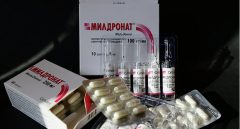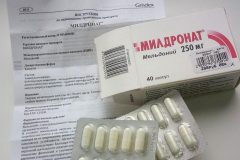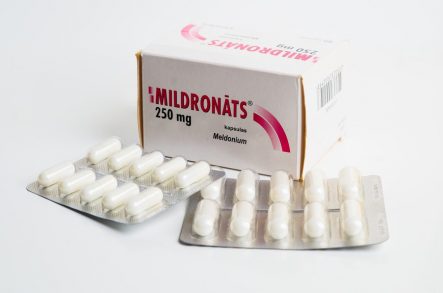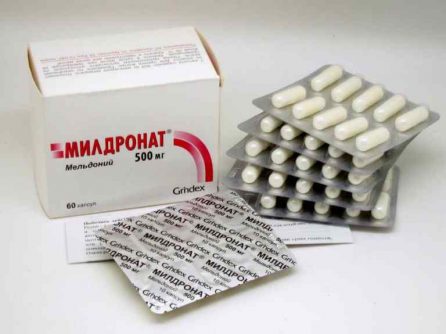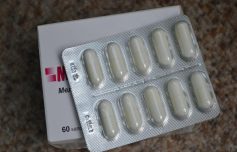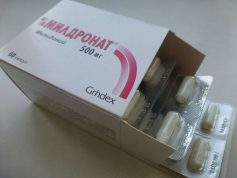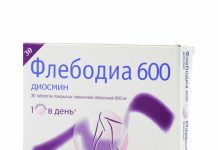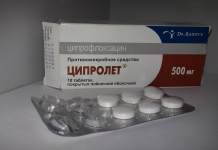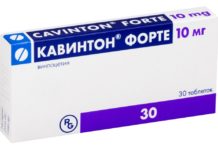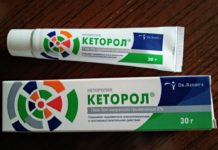There are a number of general strengthening therapies. Indications for the use of Mildronate are conditions that are characterized by impaired blood circulation, energy metabolism, as well as insufficient supply of cells with nutrient components.
Material Content:
Release forms and composition
This remedy can be purchased in several forms of release:
- Mildronate tablets 500 mg;
- 5 ml solution;
- syrup;
- 250 and 500 mg capsules.
The main active element of the medication is meldonium. As well as medicinal medication, a number of additional components are presented: calcium stearate, silicon dioxide. Capsules are packaged in 10 or 4 blisters in a cardboard box. In 1 ml of solution contains 100 mg of the main compound - dispensed in packs of 5 ampoules.
Read also:meldonium: effect on the body
Pharmacological properties and pharmacokinetics
Pharmacological properties are angioprotective, cardioprotective, as well as antihypoxic effects. The main component of the drug has a positive effect on metabolic processes, while enhancing the energy supply of tissues. Meldonium acts as an analogue of gamma-butyrobetaine, which is part of every cell in the body. As a result, it is able to stimulate humoral immunity and carry out cardioprotective effects.
Mildronate injections directly affect the contractile function of the heart muscle, significantly reducing the risk of angina pectoris. With ischemic pathology (CHD), the medication has a positive effect on blood circulation, and also stops pathological disorders of the central nervous system. In addition, you can select the entire list of pharmacodynamics of a therapeutic agent:
- Relieves spasm of vascular walls, widens their lumen, helps normalize cerebral circulation.
- Makes organ cells more resistant to oxygen deficiency and prevents damage due to hypoxia.
- Relieves angina attacks and pain discomfort, relieves the load on the myocardium.
- It is often used for withdrawal symptoms.
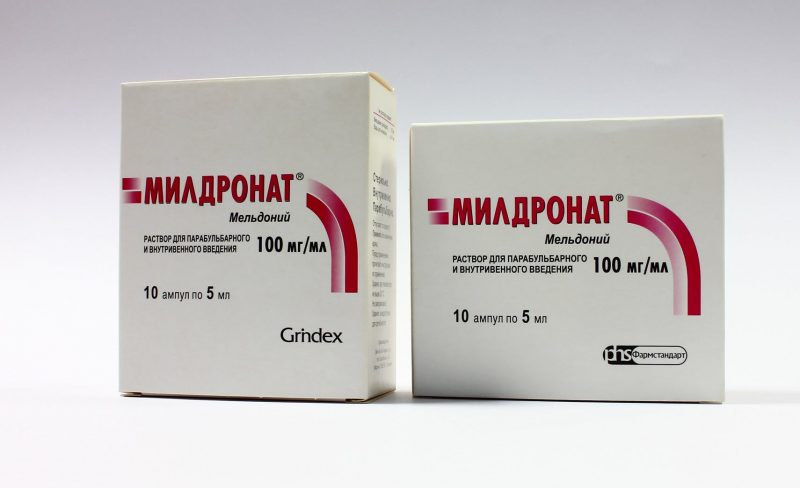 Immediately after taking the medicine, there is an immediate absorption and absorption in the gastric tract. The highest concentration is observed after an hour and a half. The drug is excreted through the kidneys.
Immediately after taking the medicine, there is an immediate absorption and absorption in the gastric tract. The highest concentration is observed after an hour and a half. The drug is excreted through the kidneys.
What is Mildronate prescribed?
The drug Mildronate is widely used in the treatment of cardiovascular disorders, to normalize the condition with physical or mental exhaustion. But also the tool is often used by athletes to restore physical strength. According to official appointments, this medication is in demand in such cases:
- Stroke.
- Heart failure.
- Coronary heart disease, angina pectoris, heart attack.
- Cerebrovascular insufficiency.
- Reduced performance.
- Hemophthalmus (eyeball pathology).
- Retinal hemorrhage.
- Abstinence.
- Bronchial asthma.
- Retinal developmental disorders.
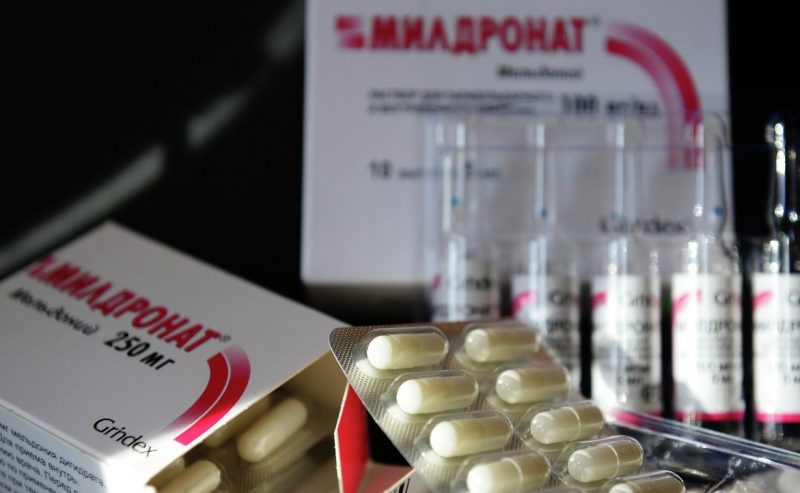 As a rule, Mildronate is used for prophylactic purposes or for treating a patient’s stable condition, but it is ineffective in cases of acute illness. A positive therapeutic effect is observed during the treatment of vascular or dystrophic disorders of the fundus.
As a rule, Mildronate is used for prophylactic purposes or for treating a patient’s stable condition, but it is ineffective in cases of acute illness. A positive therapeutic effect is observed during the treatment of vascular or dystrophic disorders of the fundus.
Instructions for use of the drug
As indicated in the instructions for use, therapy with Mildronate is carried out 2-3 times per year. The tablet form should be taken orally with a large amount of liquid. It is recommended to drink the medicine in the morning. The amount of the drug and the duration of administration are determined by a specialist.
Mildronate Injection Ampoules
In coronary syndrome, patients are given one ampoule per day. The maximum dosage is 1 g. Further treatment is made up of tablets. In the case of a violation of the structure of the eyeball, parabulbar administration of 0.5 ml is indicated. In case of circulatory disorders, the administration of 0.5 g of the solution is indicated intravenously. The duration of therapy is 10 days. In the case of the chronic form of this disorder, a three-time administration of the drug is prescribed intramuscularly, the dosage is 0.5 g. The duration of therapy is from two weeks to one month. For patients with alcohol withdrawal syndrome, droppers of 0.5 ml per day are recommended for 10 days.
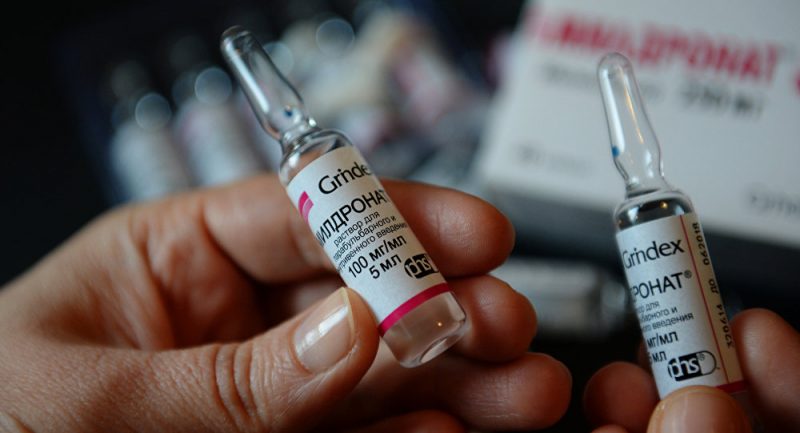
250 mg tablets
Mildronate tablets are often prescribed for chronic heart and vascular diseases. The maximum daily dosage is 0.5-1 g in two doses. The duration of therapy is one and a half months. With ischemic disorder (angina pectoris, myocardial infarction), 2 tablets are prescribed for 6 weeks. People involved in heavy physical exertion are prescribed 0.5-1 g for two weeks.
500 mg capsules
For patients with dishormonal cardiomyopathy, this therapeutic agent is prescribed in combination with other drugs. The duration of therapy is 12 days, 1 capsule per day. In the case of cerebrovascular insufficiency, 1 g is prescribed 2 times a day, the duration of therapy is 6 weeks. Chronic diseases associated with the circulatory system are treated with complex therapy of 500 mg of Mildronate 4 weeks. With physical exhaustion, 500 mg is prescribed for two weeks.
Drug interaction
Reception of Mildronate along with other drugs should be coordinated with the attending physician, since some drugs may lose their pharmacological effect. The main component of Mildronate affects cardiac glucosides and antihypertensive drugs. In this case, the use of this drug in combination with arrhythmic drugs, anticoagulants, diuretics, antianginal drugs and bronchodilators is allowed. It is also important to consider that adjoining with nitroglycerin and antihypertensive drugs significantly increases the risk of hypotension.
Contraindications, side effects and overdose
It is not recommended to resort to the use of this drug in such cases:
- Intracranial tumor.
- Pathology of venous outflow.
- Inadequate response of the immune system to an irritant (allergy is possible).
- Excessive intracranial pressure.
- The age of the patient is up to 18 years.
- Pregnancy and lactation.
Dosage adjustment, as well as constant monitoring, is necessary for patients with impaired renal and liver function. This metabolic agent is not prescribed during pregnancy and lactation due to the lack of necessary studies in this area.
Among the undesirable consequences from the use of Mildronate include the following conditions:
- inadequate response of the immune system to an irritant (allergy in the form of urticaria, hyperthermia);
- dyspepsia;
- lowering blood pressure;
- bouts of heart palpitations;
- increased irritability;
- eosinophilia (an increase in their number in blood plasma is extremely rare);
- muscle weakness.
This medicinal product does not affect motor function or concentration. In case of exceeding the prescribed dosage of the drug, the occurrence of signs of an overdose is not excluded. The victim has low blood pressure, heart rate is increased, there are attacks of migraine and weakness. In this case, the patient must seek medical help for symptomatic treatment.
Metabolic analogues
In case of an allergic reaction to the constituent components, the therapeutic agent can be replaced with the following substitute drugs: Meldonium (capsules), Cardionate, Melfor, Flowerpot, Trizipin, Metamax. These Mildronate analogues are synonymous with pharmacological effects, and also have similar contraindications and adverse reactions. Before replacement, specialist advice is required.
Mildronate refers to a wide range of effects aimed at increasing efficiency, reducing physical or mental stress, as well as correcting various disorders of the cardiovascular system. There are a number of contraindications and undesirable manifestations on the part of the body.


